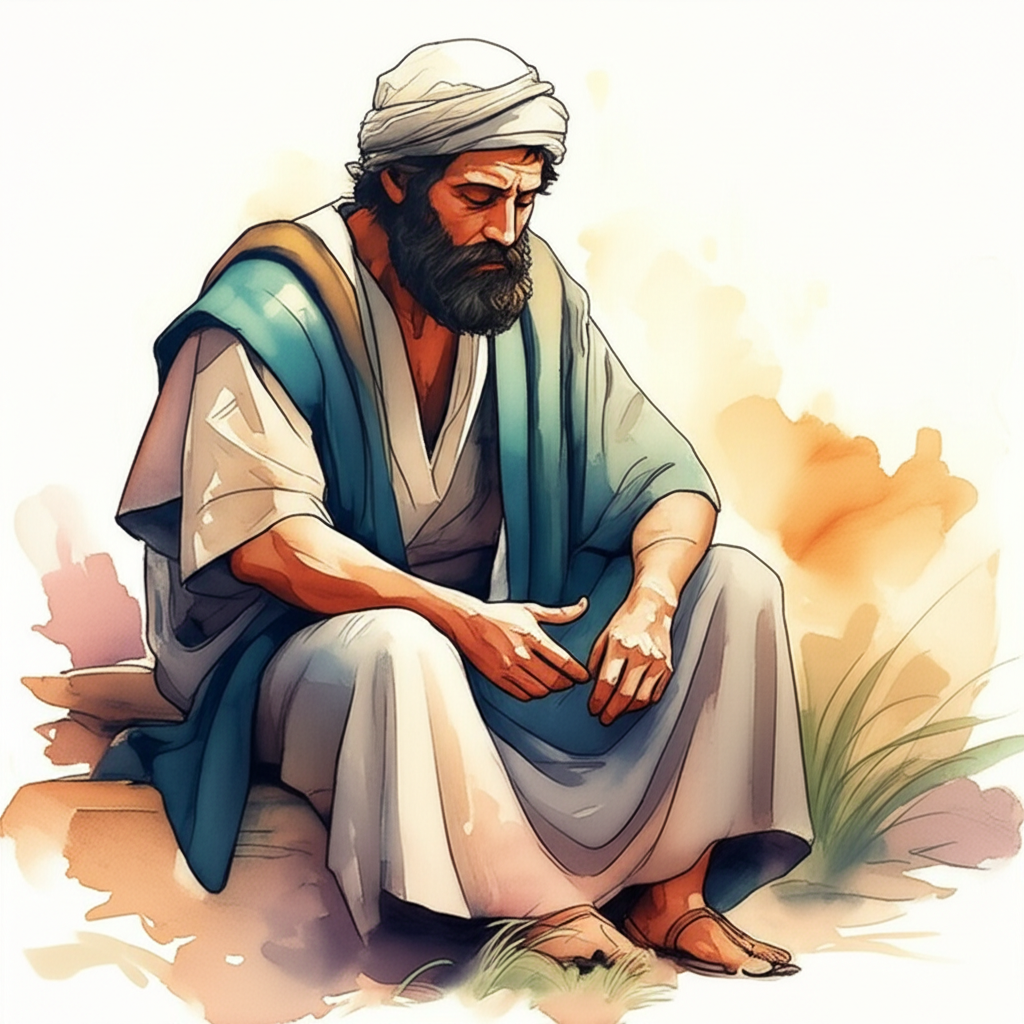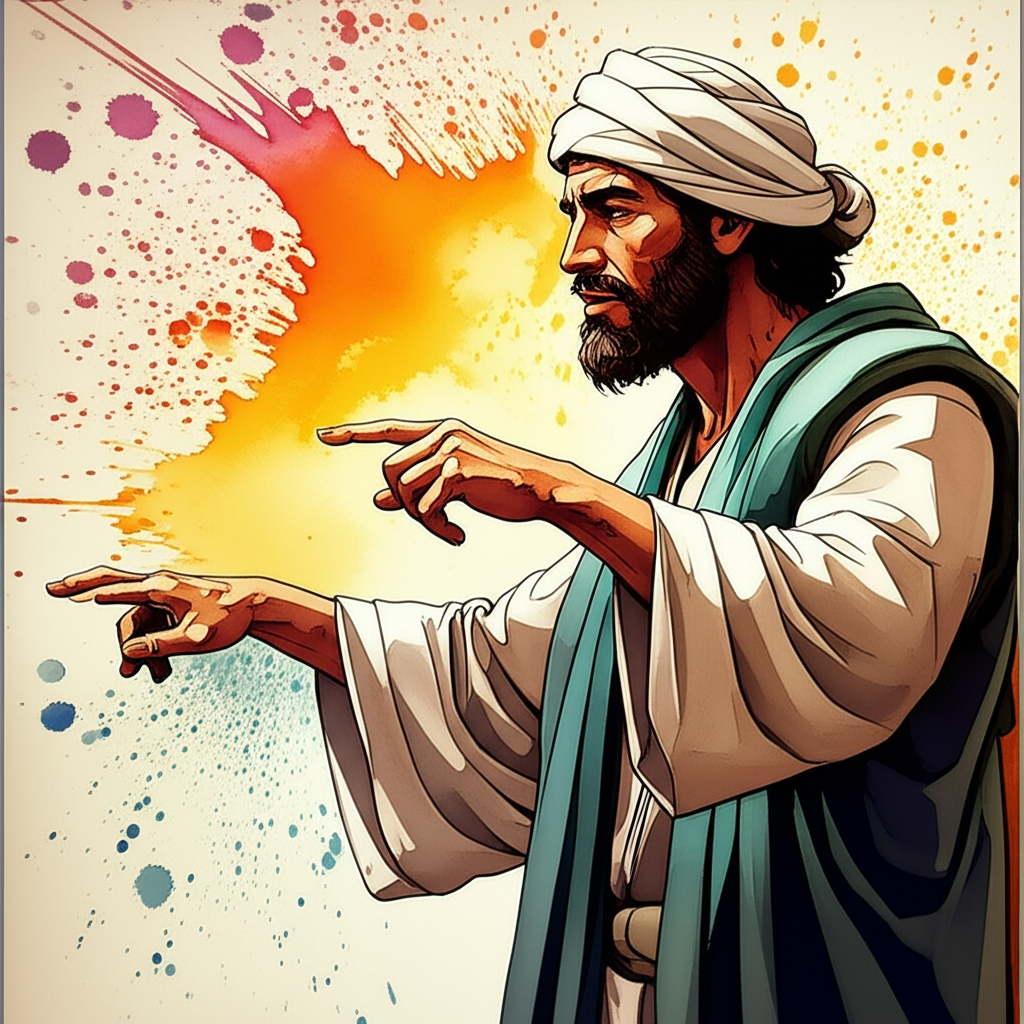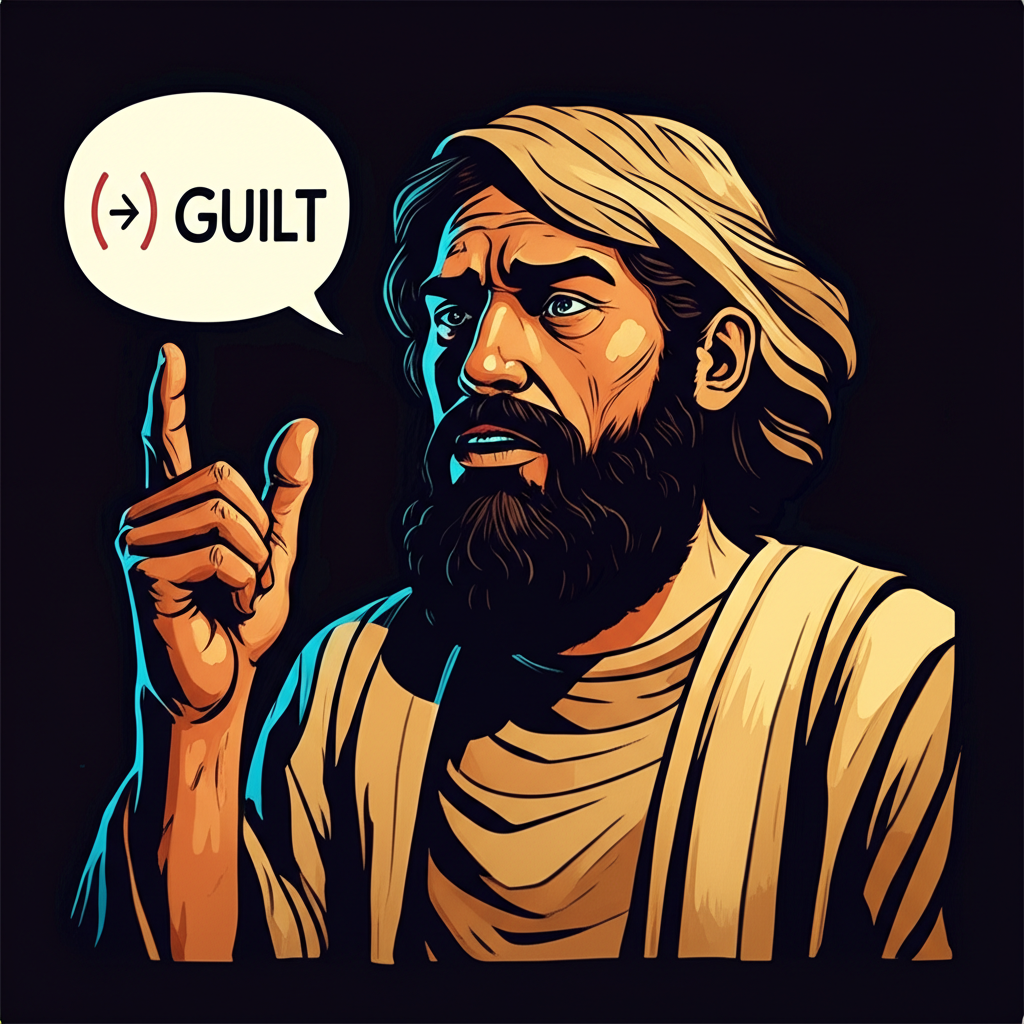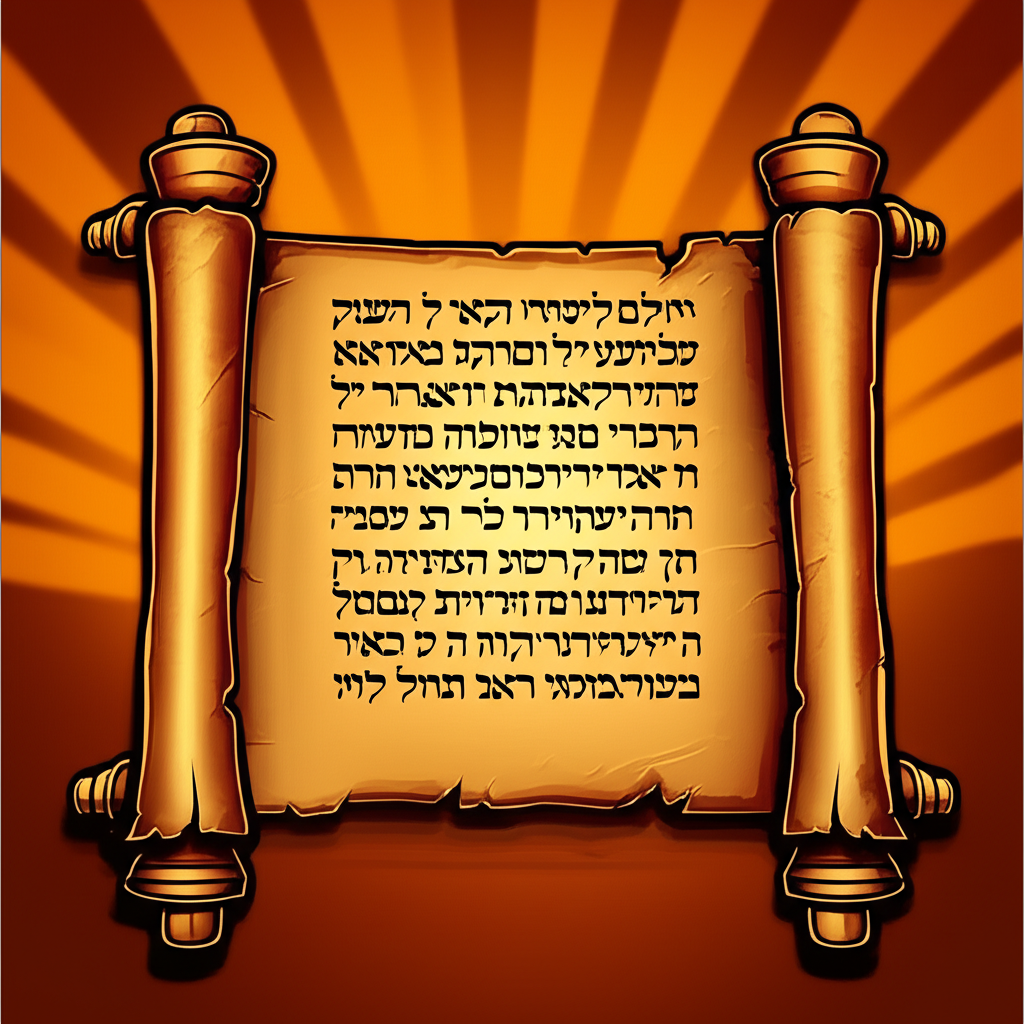Job 11 meaning explained in AI Summary
Chapter 11 features Zophar, the third of Job's friends, entering the debate about Job's suffering. Zophar's speech is marked by harsh criticism and a lack of empathy for Job's plight.
1. Zophar's Frustration (11:1-6): Zophar is fed up with Job's lengthy defense and complaints. He believes Job's words are empty and arrogant. He implies that Job's suffering must be punishment for hidden sins, and that Job is foolishly trying to justify himself before God.
2. God's Unfathomable Wisdom (11:7-12): Zophar argues that God is infinitely wiser than Job. He claims that Job cannot comprehend God's ways or the reasons behind his suffering. Zophar uses powerful imagery, comparing God's wisdom to the vastness of the sea and the heavens.
3. Repentance as the Only Way (11:13-20): Zophar offers the traditional solution: repentance. He urges Job to turn away from sin, purify his heart, and seek God's forgiveness. He promises that if Job repents, God will restore his fortunes and bring him peace. However, this offer is conditional and lacks any real understanding of Job's innocence.
Key Themes:
- Human Limitedness vs. Divine Wisdom: Zophar emphasizes the vast difference between human understanding and God's infinite knowledge. He believes humans should not question God's actions.
- Retribution Theology: Zophar firmly believes in a direct link between sin and suffering. He assumes Job's suffering is a consequence of his hidden wrongdoing.
- False Hope: While Zophar offers hope for restoration, it is conditional on Job confessing to sins he hasn't committed. This highlights the flawed logic of his argument.
Overall: Chapter 11 presents a harsh and judgmental perspective on Job's suffering. Zophar's speech lacks empathy and offers a simplistic solution based on a flawed understanding of God's justice.
Job 11 bible study ai commentary
Zophar the Naamathite delivers the first of his two speeches, marking the harshest and most dogmatic attack on Job yet. He dismisses Job’s pleas as arrogant chatter, arguing that Job's suffering is not only deserved but actually lenient punishment for hidden sin. Zophar wields the truth of God’s infinite and unknowable wisdom not as a comfort, but as a weapon to silence Job's questions. He then presents a rigid, formulaic call to repentance, promising restoration on the condition of Job’s confession, and concludes by consigning Job to the fate of the wicked if he refuses.
Job 11 context
Zophar's speech concludes the first cycle of dialogues between Job and his three friends. While Eliphaz argued from mystical experience and Bildad from tradition, Zophar argues from pure, rigid dogma. He represents a legalistic, propositional approach to faith that presumes to understand God's system of justice perfectly. His origin as a "Naamathite" is uncertain, possibly placing him in northern Arabia. This speech is a powerful example within Wisdom Literature of how correct theological truths (like God's transcendence) can be misapplied cruelly without pastoral wisdom and compassion.
Job 11:1-3
Then Zophar the Naamathite answered and said: "Should a multitude of words go unanswered, and a man full of talk be justified? Should your babble silence men, and when you mock, shall no one shame you?
In-depth-analysis
- Zophar immediately attacks Job not for his ideas, but for his verbosity. He equates Job's lengthy lament with guilt.
- Word: "full of talk" is literally 'ish sephathayim', "a man of lips," a derisive term suggesting someone who talks without substance.
- He frames Job’s honest lament and questioning as "babble" (baddim) and "mockery." This shows a complete lack of empathy and a wilful misinterpretation of Job's profound anguish.
- Zophar positions himself as the one who will finally "shame" Job and uphold divine honor, revealing his own self-righteousness.
Bible references
- Proverbs 10:19: "When words are many, transgression is not lacking, but whoever restrains his lips is prudent." (Zophar applies a general wisdom saying as a direct accusation).
- Matthew 12:36-37: "I tell you, on the day of judgment people will give account for every careless word they speak, for by your words you will be justified, and by your words you will be condemned." (Illustrates the principle Zophar is misusing against Job).
Cross references
Ecc 5:3 (dreams from many cares, folly from many words), Pro 29:20 (a man hasty in words has less hope than a fool), Jas 1:19 (be quick to hear, slow to speak), Job 8:2 (how long will you say these things?).
Job 11:4
For you have said, ‘My doctrine is pure, and I am clean in God’s eyes.’
In-depth-analysis
- Zophar quotes or paraphrases Job to accuse him of arrogant self-righteousness. Job did claim innocence of the crimes Zophar assumes he committed (Job 9:21, 10:7), but he never claimed absolute sinless perfection.
- Word: "doctrine" (leqach) refers to teaching or learning. Zophar accuses Job of promoting a false teaching about his own purity.
- This is a classic straw man argument. Zophar twists Job's cry of bewilderment and claim of relative integrity into a boast of flawless purity, making Job easier to condemn.
Bible references
- Job 9:21: "I am blameless; I regard not myself; I loathe my life." (Job's actual statement shows despair, not proud doctrine).
- Luke 18:11-12: "The Pharisee...prayed thus with himself, ‘God, I thank you that I am not like other men...'" (Shows the kind of self-righteousness Zophar wrongly attributes to Job).
Cross references
Job 6:10 (Job's integrity), Job 10:7 (you know I am not guilty), Job 23:10-12 (Job's defense of his path), Pro 16:2 (all a man's ways seem pure to him).
Job 11:5-6
But oh, that God would speak and open his lips against you, and that he would tell you the secrets of wisdom! For they are twofold in understanding. Know then that God exacts of you less than your iniquity deserves.
In-depth-analysis
- This is a statement of profound cruelty and dramatic irony. Zophar wishes God would appear to vindicate the friends and condemn Job. God will eventually speak (Job 38) but will condemn the friends for misrepresenting Him (Job 42:7).
- "secrets of wisdom" (ta'alumot chokmah): Zophar claims to have insight into a higher, hidden wisdom that proves Job's guilt.
- "twofold in understanding" (kiphlayim letushiyah): A difficult phrase. It suggests wisdom is multifaceted, complex, or that its true nature is double what one can see. Zophar implies the reality of Job's sin is far worse than what is apparent.
- The ultimate blow: "God exacts of you less than your iniquity deserves." He claims Job’s unimaginable suffering is an act of divine mercy. This invalidates Job’s pain and amplifies his sense of injustice.
Bible references
- Romans 11:33: "Oh, the depth of the riches and wisdom and knowledge of God! How unsearchable are his judgments and how inscrutable his ways!" (Paul states the truth of God's wisdom in a context of worship; Zophar uses it as a weapon of condemnation).
- Ezra 9:13: "...our God, have punished us less than our iniquities deserved..." (A valid corporate confession of a nation in sin, but cruelly misapplied by Zophar to a righteous individual).
Cross references
Deu 29:29 (secret things belong to God), Psa 25:14 (the secret of the Lord), Lam 3:22 (God's mercies), Job 38:1-3 (God finally speaks).
Job 11:7-9
Can you find out the deep things of God? Can you find out the limit of the Almighty? It is higher than heaven—what can you do? Deeper than Sheol—what can you know? Its measure is longer than the earth and broader than the sea.
In-depth-analysis
- This is the theological core of Zophar’s speech and contains profound, undeniable truth about God's transcendence and incomprehensibility. The theology is correct; the application is cruel.
- He uses a series of rhetorical questions and cosmic comparisons (heaven, Sheol, earth, sea) to emphasize the infinite gap between God's knowledge and human understanding.
- His intent is not to inspire awe, but to shut Job up. He implies that because Job cannot fathom God's wisdom, he has no right to question his circumstances. He must simply accept he is a sinner being punished.
Bible references
- Isaiah 55:8-9: "For my thoughts are not your thoughts, neither are your ways my ways... For as the heavens are higher than the earth, so are my ways higher than your ways..." (A direct parallel affirming God's transcendent nature, used to offer grace).
- Psalm 139:6: "Such knowledge is too wonderful for me; it is high, I cannot attain it." (David's humble admission in the face of God's omniscience, leading to comfort).
- Ephesians 3:18: "...may have strength to comprehend with all the saints what is the breadth and length and height and depth..." (Paul prays for believers to comprehend the love of Christ, which fills the cosmic dimensions Zophar uses to describe unknowable wisdom).
Cross references
Isa 40:28 (God's understanding is unsearchable), Psa 145:3 (God's greatness is unsearchable), Rom 11:33-34 (God's inscrutable judgments), 1 Cor 2:10-11 (Spirit searches the deep things).
Job 11:10-12
If he passes by and imprisons and summons the court, who can turn him back? For he knows worthless men; when he sees iniquity, will he not consider it? But a stupid man will get understanding when a wild donkey's colt is born a man.
In-depth-analysis
- Zophar continues his theme: God is an all-powerful, all-seeing judge. He sees "worthless men" (mǝtê-šāw') and their iniquity, and no one can stop His judgment. The clear implication is that Job is such a man.
- Verse 12 is a famously harsh and proverbial insult. The comparison of a "stupid man" (ish nabub, 'hollow man') to a "wild donkey's colt" ('ayir pere) is stark. The wild donkey was a symbol of untamable, senseless wildness.
- The statement is one of impossibility: a hollow man will gain wisdom only when a wild animal is born human—i.e., never. Zophar is calling Job irredeemably foolish for maintaining his innocence.
Bible references
- Psalm 94:11: "The LORD knows the thoughts of man, that they are but a breath." (Affirms God's knowledge of human folly, but without Zophar's targeted venom).
- Daniel 4:35: "...he does according to his will among the host of heaven and among the inhabitants of the earth; and none can stay his hand..." (Declares God's absolute sovereignty).
Cross references
Psa 10:14 (God sees trouble), Hos 7:2 (their deeds surround them), Psa 49:10-12 (man in his pomp is like the beasts that perish), Jer 2:24 (a wild donkey).
Job 11:13-19
If you prepare your heart and stretch out your hands toward him, if you put iniquity far from your hand and let not injustice dwell in your tents, then you will lift up your face without blemish; you will be secure and will not fear... Your life will be brighter than the noonday; its darkness will be like the morning... and you will have hope... and you will lie down, and none will make you afraid...
In-depth-analysis
- Zophar pivots to a conditional promise of restoration. He lays out a formula for blessing: if Job repents and purifies himself, then God will restore him completely.
- This is the standard theology of retribution and repentance. The elements—preparing the heart, prayer ("stretch out your hands"), and removing sin—are all biblically sound actions.
- The promised restoration is described beautifully: confidence ("lift up your face without blemish"), security, hope, light replacing darkness, and peace.
- The problem is that this is a simplistic, transactional "gospel" that completely ignores the reality of Job's situation. Zophar presumes to know the "if," therefore he can guarantee the "then."
Bible references
- Deuteronomy 4:29: "But from there you will seek the LORD your God and you will find him, if you search after him with all your heart and with all your soul." (Shows the classic biblical pattern of seeking and finding God).
- Isaiah 1:18: "Come now, let us reason together, says the LORD: though your sins are like scarlet, they shall be as white as snow..." (God's offer of cleansing, rooted in His own grace, not just a formula).
- Psalm 51:10: "Create in me a clean heart, O God, and renew a right spirit within me." (The posture of true repentance, acknowledging that only God can purify the heart).
Cross references
1 Sam 7:3 (prepare your hearts), Psa 88:9 (I call out to you), Isa 58:6-9 (the true fast and its blessings), Psa 37:6 (righteousness shine like the noonday), Lev 26:6 (lie down with no fear).
Job 11:20
But the eyes of the wicked will fail; all way of escape will be lost to them, and their hope will be to breathe their last.
In-depth-analysis
- Zophar ends his speech with a chilling ultimatum. After offering a path of light for the repentant, he describes the path of darkness for the wicked.
- "The eyes of the wicked will fail" as they look for deliverance that never comes.
- "all way of escape will be lost" (manos avad minhem), lit., 'refuge has perished from them'.
- His final words define the hope of the wicked as death (mappach nephesh - a puffing out of the soul/life). By placing this verse at the end, he directly implies this is Job’s fate if he fails to follow Zophar's prescribed plan. It's a final, brutal condemnation.
Bible references
- Proverbs 11:7: "When the wicked dies, his hope will perish, and the expectation of builders comes to nothing." (Standard wisdom teaching that Zophar weaponizes).
- Lamentations 3:18: "So I say, 'My endurance has perished; so has my hope from the LORD.'" (The cry of despair that Job feels, here twisted by Zophar into the deserved fate of the wicked).
Cross references
Deu 28:65-67 (curses for disobedience, failing eyes), Psa 142:4 (no one cares for my soul, no refuge), Pro 10:28 (the hope of the righteous is joy), Amos 9:1-4 (no escape from God's judgment).
Job chapter 11 analysis
- The Flaw of Dogmatic Theology: Zophar's speech is a masterclass in how correct theological statements can become instruments of cruelty. He champions God’s transcendence (v. 7-9) and the call to repentance (v. 13-14), both true doctrines. However, he divorces them from love, empathy, and situational awareness. He has the "what" of theology but not the "how" or "when" of pastoral care. This is a critique of a rigid faith that values being "right" over being compassionate.
- Irony of God's Silence and Speech: Zophar’s desire for God to speak against Job (v. 5) is deeply ironic. God's ultimate speech (Job 38-41) does not answer Job’s "why" questions but reveals His majesty, which ultimately humbles and satisfies Job. Furthermore, God explicitly condemns Zophar and his friends for having "not spoken of me what is right, as my servant Job has" (Job 42:7).
- A "Gospel" Without Grace: Zophar's offer in vv. 13-19 is purely transactional. It’s a formula: If Job performs the correct penitent actions, then God is obligated to restore him. This is a stark contrast to the New Testament gospel, which is founded not on human action but on God's preemptive, unmerited grace toward the broken and suffering. Zophar offers a system; Christ offers Himself.
Job 11 summary
Zophar launches the most severe and dogmatic assault yet, accusing Job of being a liar whose immense suffering is less than his hidden sins deserve. He wields the truth of God's unsearchable wisdom as a club to silence Job's complaints. He then outlines a rigid formula for restoration based on repentance, concluding with a harsh ultimatum that if Job refuses, his only hope is death.
Job 11 AI Image Audio and Video










Job chapter 11 kjv
- 1 Then answered Zophar the Naamathite, and said,
- 2 Should not the multitude of words be answered? and should a man full of talk be justified?
- 3 Should thy lies make men hold their peace? and when thou mockest, shall no man make thee ashamed?
- 4 For thou hast said, My doctrine is pure, and I am clean in thine eyes.
- 5 But oh that God would speak, and open his lips against thee;
- 6 And that he would shew thee the secrets of wisdom, that they are double to that which is! Know therefore that God exacteth of thee less than thine iniquity deserveth.
- 7 Canst thou by searching find out God? canst thou find out the Almighty unto perfection?
- 8 It is as high as heaven; what canst thou do? deeper than hell; what canst thou know?
- 9 The measure thereof is longer than the earth, and broader than the sea.
- 10 If he cut off, and shut up, or gather together, then who can hinder him?
- 11 For he knoweth vain men: he seeth wickedness also; will he not then consider it?
- 12 For vain men would be wise, though man be born like a wild ass's colt.
- 13 If thou prepare thine heart, and stretch out thine hands toward him;
- 14 If iniquity be in thine hand, put it far away, and let not wickedness dwell in thy tabernacles.
- 15 For then shalt thou lift up thy face without spot; yea, thou shalt be stedfast, and shalt not fear:
- 16 Because thou shalt forget thy misery, and remember it as waters that pass away:
- 17 And thine age shall be clearer than the noonday: thou shalt shine forth, thou shalt be as the morning.
- 18 And thou shalt be secure, because there is hope; yea, thou shalt dig about thee, and thou shalt take thy rest in safety.
- 19 Also thou shalt lie down, and none shall make thee afraid; yea, many shall make suit unto thee.
- 20 But the eyes of the wicked shall fail, and they shall not escape, and their hope shall be as the giving up of the ghost.
Job chapter 11 nkjv
- 1 Then Zophar the Naamathite answered and said:
- 2 "Should not the multitude of words be answered? And should a man full of talk be vindicated?
- 3 Should your empty talk make men hold their peace? And when you mock, should no one rebuke you?
- 4 For you have said, 'My doctrine is pure, And I am clean in your eyes.'
- 5 But oh, that God would speak, And open His lips against you,
- 6 That He would show you the secrets of wisdom! For they would double your prudence. Know therefore that God exacts from you Less than your iniquity deserves.
- 7 "Can you search out the deep things of God? Can you find out the limits of the Almighty?
- 8 They are higher than heaven? what can you do? Deeper than Sheol? what can you know?
- 9 Their measure is longer than the earth And broader than the sea.
- 10 "If He passes by, imprisons, and gathers to judgment, Then who can hinder Him?
- 11 For He knows deceitful men; He sees wickedness also. Will He not then consider it?
- 12 For an empty-headed man will be wise, When a wild donkey's colt is born a man.
- 13 "If you would prepare your heart, And stretch out your hands toward Him;
- 14 If iniquity were in your hand, and you put it far away, And would not let wickedness dwell in your tents;
- 15 Then surely you could lift up your face without spot; Yes, you could be steadfast, and not fear;
- 16 Because you would forget your misery, And remember it as waters that have passed away,
- 17 And your life would be brighter than noonday. Though you were dark, you would be like the morning.
- 18 And you would be secure, because there is hope; Yes, you would dig around you, and take your rest in safety.
- 19 You would also lie down, and no one would make you afraid; Yes, many would court your favor.
- 20 But the eyes of the wicked will fail, And they shall not escape, And their hope?loss of life!"
Job chapter 11 niv
- 1 Then Zophar the Naamathite replied:
- 2 "Are all these words to go unanswered? Is this talker to be vindicated?
- 3 Will your idle talk reduce others to silence? Will no one rebuke you when you mock?
- 4 You say to God, 'My beliefs are flawless and I am pure in your sight.'
- 5 Oh, how I wish that God would speak, that he would open his lips against you
- 6 and disclose to you the secrets of wisdom, for true wisdom has two sides. Know this: God has even forgotten some of your sin.
- 7 "Can you fathom the mysteries of God? Can you probe the limits of the Almighty?
- 8 They are higher than the heavens above?what can you do? They are deeper than the depths below?what can you know?
- 9 Their measure is longer than the earth and wider than the sea.
- 10 "If he comes along and confines you in prison and convenes a court, who can oppose him?
- 11 Surely he recognizes deceivers; and when he sees evil, does he not take note?
- 12 But the witless can no more become wise than a wild donkey's colt can be born human.
- 13 "Yet if you devote your heart to him and stretch out your hands to him,
- 14 if you put away the sin that is in your hand and allow no evil to dwell in your tent,
- 15 then, free of fault, you will lift up your face; you will stand firm and without fear.
- 16 You will surely forget your trouble, recalling it only as waters gone by.
- 17 Life will be brighter than noonday, and darkness will become like morning.
- 18 You will be secure, because there is hope; you will look about you and take your rest in safety.
- 19 You will lie down, with no one to make you afraid, and many will court your favor.
- 20 But the eyes of the wicked will fail, and escape will elude them; their hope will become a dying gasp."
Job chapter 11 esv
- 1 Then Zophar the Naamathite answered and said:
- 2 "Should a multitude of words go unanswered, and a man full of talk be judged right?
- 3 Should your babble silence men, and when you mock, shall no one shame you?
- 4 For you say, 'My doctrine is pure, and I am clean in God's eyes.'
- 5 But oh, that God would speak and open his lips to you,
- 6 and that he would tell you the secrets of wisdom! For he is manifold in understanding. Know then that God exacts of you less than your guilt deserves.
- 7 "Can you find out the deep things of God? Can you find out the limit of the Almighty?
- 8 It is higher than heaven ? what can you do? Deeper than Sheol ? what can you know?
- 9 Its measure is longer than the earth and broader than the sea.
- 10 If he passes through and imprisons and summons the court, who can turn him back?
- 11 For he knows worthless men; when he sees iniquity, will he not consider it?
- 12 But a stupid man will get understanding when a wild donkey's colt is born a man!
- 13 "If you prepare your heart, you will stretch out your hands toward him.
- 14 If iniquity is in your hand, put it far away, and let not injustice dwell in your tents.
- 15 Surely then you will lift up your face without blemish; you will be secure and will not fear.
- 16 You will forget your misery; you will remember it as waters that have passed away.
- 17 And your life will be brighter than the noonday; its darkness will be like the morning.
- 18 And you will feel secure, because there is hope; you will look around and take your rest in security.
- 19 You will lie down, and none will make you afraid; many will court your favor.
- 20 But the eyes of the wicked will fail; all way of escape will be lost to them, and their hope is to breathe their last."
Job chapter 11 nlt
- 1 Then Zophar the Naamathite replied to Job:
- 2 "Shouldn't someone answer this torrent of words?
Is a person proved innocent just by a lot of talking? - 3 Should I remain silent while you babble on?
When you mock God, shouldn't someone make you ashamed? - 4 You claim, 'My beliefs are pure,'
and 'I am clean in the sight of God.' - 5 If only God would speak;
if only he would tell you what he thinks! - 6 If only he would tell you the secrets of wisdom,
for true wisdom is not a simple matter.
Listen! God is doubtless punishing you
far less than you deserve! - 7 "Can you solve the mysteries of God?
Can you discover everything about the Almighty? - 8 Such knowledge is higher than the heavens ?
and who are you?
It is deeper than the underworld ?
what do you know? - 9 It is broader than the earth
and wider than the sea. - 10 If God comes and puts a person in prison
or calls the court to order, who can stop him? - 11 For he knows those who are false,
and he takes note of all their sins. - 12 An empty-headed person won't become wise
any more than a wild donkey can bear a human child. - 13 "If only you would prepare your heart
and lift up your hands to him in prayer! - 14 Get rid of your sins,
and leave all iniquity behind you. - 15 Then your face will brighten with innocence.
You will be strong and free of fear. - 16 You will forget your misery;
it will be like water flowing away. - 17 Your life will be brighter than the noonday.
Even darkness will be as bright as morning. - 18 Having hope will give you courage.
You will be protected and will rest in safety. - 19 You will lie down unafraid,
and many will look to you for help. - 20 But the wicked will be blinded.
They will have no escape.
Their only hope is death."
- Bible Book of Job
- 1 Story of Job
- 2 Satan Attacks Job's Health
- 3 Job Laments His Birth
- 4 Eliphaz Speaks: The Innocent Prosper
- 5 Call now; is there anyone who will answer you? To which of the holy ones will
- 6 Job Replies: My Complaint Is Just
- 7 Job Continues: My Life Has No Hope
- 8 Bildad Speaks: Job Should Repent
- 9 Job Replies: There Is No Arbiter
- 10 Job Continues: A Plea to God
- 11 Zophar Speaks: You Deserve Worse
- 12 Job Replies: The Lord Has Done This
- 13 Job Continues: Still I Will Hope in God
- 14 Job Continues: Death Comes Soon to All
- 15 Eliphaz Accuses: Job Does Not Fear God
- 16 Job Replies: Miserable Comforters Are You
- 17 Job Continues: Where Then Is My Hope?
- 18 Bildad Speaks: God Punishes the Wicked
- 19 Job Replies: My Redeemer Lives
- 20 Zophar Speaks: The Wicked Will Suffer
- 21 Job Replies: The Wicked Do Prosper
- 22 Eliphaz Speaks: Job's Wickedness Is Great
- 23 Job Replies: Where Is God?
- 24 Why are not times of judgment kept by the Almighty, and why do those who know
- 25 Bildad Speaks: Man Cannot Be Righteous
- 26 Job Replies: God's Majesty Is Unsearchable
- 27 Job Continues: I Will Maintain My Integrity
- 28 Job Continues: Where Is Wisdom?
- 29 Job's Summary Defense
- 30 But now they laugh at me, men who are younger than I, whose fathers I would
- 31 Covenant with my Eyes
- 32 Elihu Rebukes Job's Three Friends
- 33 Elihu Rebukes Job
- 34 Elihu Asserts God's Justice
- 35 Elihu Condemns Job
- 36 Elihu Extols God's Greatness
- 37 Elihu Proclaims God's Majesty
- 38 Job questions God
- 39 Do you know when the mountain goats give birth? Do you observe the calving of
- 40 Job Promises Silence
- 41 Lord's challenge of Leviathan
- 42 Job's Repentance and Restoration